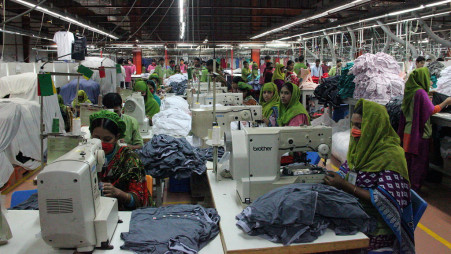European diplomats raise questions about minimum wage for RMG workers
 Photo: Collected
Photo: Collected
Garment and textile manufacturers are facing pressure from buyers to take green initiatives at their factories to make them more environmentally friendly. Initially, however, they took green initiatives out of their own motivation, according to a new study by the Centre for Policy Dialogue (CPD).
The report mentioned that, in some cases, owners are also motivated to take green initiatives due to their marketing strategies.
The CPD unveiled the findings of the study “Securing Green Transition of the Textile and Readymade Garments Sector in Bangladesh” during an event at a Dhaka hotel on Tuesday.
The report found that 69.70% of entrepreneurs invested in green initiatives based on their self-motivation, while the second highest number of entrepreneurs invested due to buyers’ requirements.
Besides, 54.55% of entrepreneurs have taken such initiatives due to their marketing strategy, and 39.39% made it to make them competitive in the market, according to the study report presented by CPD’s Research Fellow Muntaseer Kamal.
Speaking with The Business Standard, he said, “During the study, we found that entrepreneurs are motivated to green their factories for a variety of reasons.”
The study also mentioned that the average green investment in a factory in the last five years stood at Tk78.07 million in large factories, which is 36.98% of their total investment, while it is about Tk0.16 million in micro factories, which is 53.99% of their total investment.
However, the green initiative cost stood at Tk1.37 million for small and medium factories, which is 44.84% of their total investment, according to the report.
The study also recommended developing a common framework for green standards and certification procedures based on international best practices and market requirements.
“All firms would adhere to the same environmental benchmarks with a uniform standard. Moreover, a uniform certification procedure would make it easier and less costly for factories to obtain green certifications required by various buyers,” said Muntaseer Kamal.
Buyers’ consensus on green standards and certifications should be in place, he added.
CPD Executive Director Fahmida Khatun, who chaired the session, said, “RMG factories are receiving various certifications from different organisations due to buyers’ requirements, but there are different standards in the certifications, which increases their cost.”
She said, considering the importance of green initiatives, over 200 Bangladeshi factories have achieved Leadership in Energy and Environmental Design (LEED) certificates from the US Green Building Council.
“In some cases, a number of buyers do not recognise the USGBC LEED (US Green Building Council’s Leadership in Energy and Environmental Design) certificates,” she added. “We want to see green initiatives from economic, social, and environmental approaches,” she added.
Shahidullah Azim, vice president of the Bangladesh Garment Manufacturers and Exporters Association (BGMEA), said the RMG industry has already made unparalleled advancements in the green transition, and they are considered a global model of a green manufacturing hub.
“We want to continue this momentum towards excellence. The RMG industry is already under intense surveillance, but to make it more comprehensive for the wider economy, I think the approach should be ‘Securing the Green Economy’ and get the broader stakeholders on board,” he added.
At the event, State Minister for Planning Shamsul Alam suggested that manufacturers demand fair prices from brands and buyers to accelerate the greening process in the RMG sector.
“By enforcing, formulating regulations, directing, and suggesting, the government can assist the greening process,” he said, adding that they are emphasising renewable energy.
He also said green, sustainability, labour rights, and related issues will be included in the 9th Five-Year Plan.
European diplomats raised questions about the minimum wage
European diplomats attending the event said the Tk8,000 minimum wage, instituted for garment workers around five years ago, is not enough to lead a healthy life.
EU Ambassador Charles Whitely highlighted that it had been five years since the last wage revision in the garment sector, where the minimum pay was fixed at Tk8,000.
“By any stretch of the imagination, it isn’t a very healthy way to live on that salary, particularly if you have kids to feed,” he added.
Whitely said the responsibility is not solely on the government or the industry but also on brands and buyers, urging real engagement and partnerships to address the challenges faced by workers.
“So the onus is not only on the government or the industry; it’s also on brands and buyers, and there are excellent examples of real engagement and partnership amongst brands,” he noted. Referring to a UN report, Charge D’Affaires at the Netherlands Embassy in Bangladesh, Thijs Woudstra, said, “Bangladesh [should] move away from the ‘low wage trap’ when graduates [from LDC status].”
“There are no alternatives to improving working conditions and wages,” remarked Thijs Woudstra, highlighting the imperative for a comprehensive reassessment of labour policies in the sector.
Both said the issues regarding fair wages and working conditions for RMG workers – numbering around 4.5 million – needed to be addressed.
















